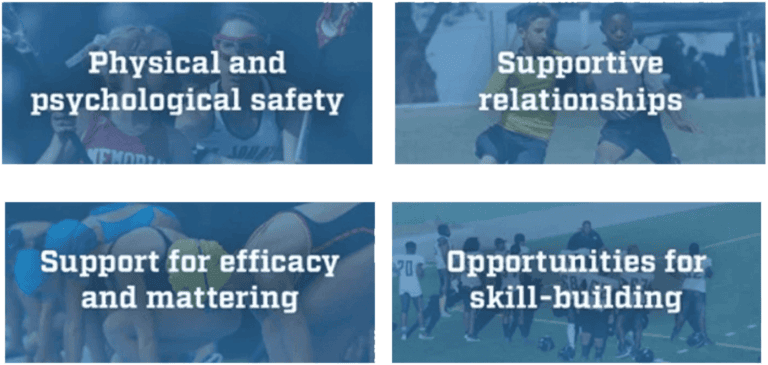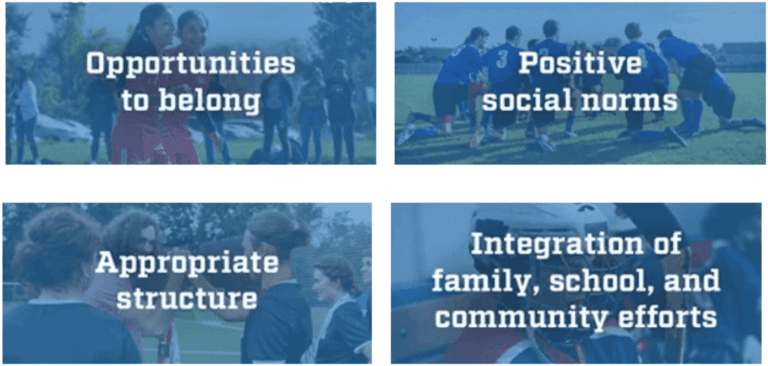OUR IMPACT
PCA works with our partners to help them provide a positive, equitable, and accessible youth sports experience for all kids.
PCA’s data indicate that as a result of PCA programs and initiatives:
Youth
Youth exhibit increased teamwork, confidence, resilience, persistence, empathy, ability to bounce back from mistakes, and become more physically active.
Coaches
Coaches exhibit the behaviors necessary for positive youth development and social emotional learning to take place (as identified by the well-established research on this topic that can be found at CASEL.org).
Coaches increase their focus on using sports to teach life skills.
Coaches feel more prepared in specific ways to use tools and techniques with their players to improve their resilience, their sportsmanship, and their character on and off the field.
Coaches increase their focus on using sports to teach life skills.
Coaches feel more prepared in specific ways to use tools and techniques with their players to improve their resilience, their sportsmanship, and their character on and off the field.
Youth Sports Organizations and Schools
Youth sports organizations and Schools see their cultures become more positive.
Schools working with PCA on closing the sports equity gap see a significant increase in the number of BIPOC students participating in sports and the number of positive youth sports opportunities available.
Schools working with PCA on closing the sports equity gap see a significant increase in the number of BIPOC students participating in sports and the number of positive youth sports opportunities available.
Communities
Communities show increased quality sports opportunities for under resourced youth.
Parents feel more connected to their child's school and their community.
Parents feel more connected to their child's school and their community.
IMPACT STUDIES AND DATA ON PCA'S WORK
Over the last 25 years PCA and external evaluators have collected data from thousands of coaches, youth, and youth sports leaders about the impact of our programming. Here are some of our evaluations and reports that show the impact of our work:
Impact Summary for Coaches and Organizations
Impact Summary for Communities
Getting and Keeping K-12 Girls in Sports and Physical Activity Literature Review, 2022
Online Course Effectiveness
Coach In-Person and Online Courses: 2021
Coach In-Person Workshops with Coaching for Character Initiative: 2020
Coach Online Courses: 2020
Examining LHSHL's Sport Culture, Environment, and Sportsmanship: 2020
End of Season Summary Coach and Partner Surveys: Fall 2019
Character Development Through Youth Sports, Tufts University: 2015
Triple Impact Competitors, See Change: 2012
The Influence of Positive Coaching Alliance on Coaches, Communities and Youth, See Change: 2012
Evaluation of PCA Online Coach Courses, See Change: 2012
CHAMPS Pilot Evaluation, Mendelsohn, Gittleman and Associates: 2010
AmeriCorps Evaluation Report - UCSF
Philliber Evaluation Report: 2007
PCA Evaluation Report, Program Evaluation Across the Nation Using Technology: 2006
RESEARCH THAT SUPPORTS PCA'S POSITIVE YOUTH DEVELOPMENT APPROACH
We rely on well-established evidence that shows that youth thrive and develop positive life skills in PYD environments, where adults exhibit a particular set of behaviors. Similarly, we rely on the well-established research regarding what adults need to do to enable social emotional learning to take place. PCA was founded on the principles from that research. An overview of the research base and approach to PYD, as well as some supporting articles, can be found here, and here.
The widely accepted eight key elements for fomenting PYD are listed below, and are the foundation of our work.


Social emotional learning (SEL) skill development and implementation has been heavily studied. An overview of what it takes to develop SEL skills in youth, as well as foundational research can be found at CASEL.org. CASEL provides one of the most widely adopted frameworks for SEL in the country. PCA's programming has strong links to the CASEL framework; a summary of how PCA programming explicitly links to social emotional learning is here.
RESEARCH UNDERPINNING PCA'S SPORTS EQUITY INITIATIVE
At PCA, our commitment to sports equity is deeply ingrained in evidence-based models and frameworks. Our approach hinges on the conviction that the entirety of our youth sports ecosystem can collaborate to form an inclusive, equitable, and universally accessible sporting milieu. Here's a closer look at the foundational principles of our Sports Equity Initiative:
Collective Impact
Our work is rooted in this model's structured alignment towards equity-driven social transformation. By adhering to its five conditions—like Shared Measurement and Continuous Communication—we synergistically tackle sports equity challenges in historically marginalized communities.
COMMUNITY ENGAGEMENT
This underpins our ethos. By applying recognized community engagement best practices, we foster collaborations, cultivate partnerships, and channel resources, all aimed at mitigating the sports equity gap faced by the youth, particularly in low-income communities of color.
COMMUNITY OF PRACTICE (COP)
Our strategy includes the use of the CoP model. We harness the collective concern and dedication of various stakeholders, focusing their energies on the sports equity challenges in low-income communities. This model fosters shared learning, the development of innovative strategies and practices, catalyzing meaningful change.
CULTURAL PROFICIENCY
This is our compass. With tools designed for introspection and inclusivity, we ensure our actions resonate with cultural sensitivity and inclusiveness. Grounded in the pioneering work of Dr. Terry Cross and Dr. Randall Lindsey, our strategies emphasize equitable outreach and impact.
SYSTEMS CHANGE THEORY
We address sports equity not as isolated challenges but as systemic concerns. Recognizing that societal issues are often tethered to underlying conditions, we employ Systems Change Theory. Our focus is holistic, targeting the root causes and aiming for lasting transformations.